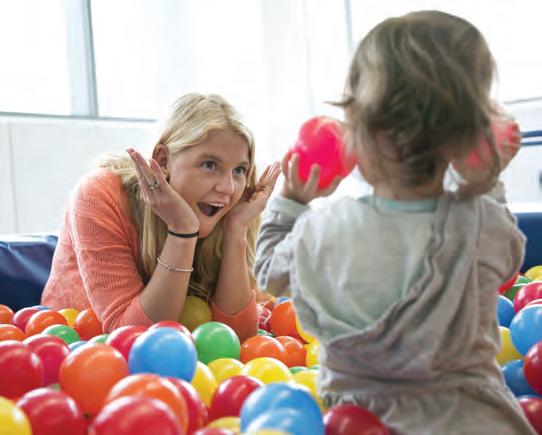
3 minute read
Panuska College of Professional Studies
PANUSKA COLLEGE O F PROFESSIONAL STUDIES
The Panuska College of Professional Studies (PCPS) offers a range of accredited majors in health, education and human services. Rooted in the liberal arts and sciences, our academic programs balance theory with practical internships, clinical experience and fieldwork, as well as required community based learning opportunities.
AT-A-GLANCE 1,209 undergraduates • 10 majors • Four-year professional development T.A.P.E.S.T.R.Y. program • Balance of theory and practice • State-of-the-art laboratories and simulation environments • Community based learning component to each program Exceptionally high pass rates and placement rates





LESSONS INTO PRACTICE
Lauren Tomasic appreciated the personal, practical education she received in the Panuska College. The small classroom settings, the close relationships with her professors, the myriad hands-on learning opportunities—all combined to create a one-of-a-kind preparation. She is currently studying physical therapy at Baylor University.
On passionate teaching
“You can tell that the professors love what they’re teaching. Their passion really comes through in the classroom, whether they’re talking about their own research or just presenting material in class. You can see it in how they teach—they get so excited about things!”
On Leahy Hall
“Leahy is one of my absolute favorite buildings on campus. I love how you can walk into some of the rooms and not even realize that you’re in a classroom. It feels like a real workplace or a professional setting. I feel so fortunate to have been able to learn in that type of an environment, with all of these resources and technologies and research labs. It’s amazing.”
On community based learning
“A really cool thing about Panuska College is that we participate in community based learning each semester. It’s an opportunity for students to step outside of their comfort zone and serve in a way that they might not otherwise do. It definitely helps us to put into practice what we learn in the classroom.”
Lauren Tomasic
Class: 2018 Majors: Exercise Science (Kinesiology) and Philosophy Hometown: Baltimore, Maryland
MEET OUR FACULT Y

Accredited by 8 DIFFERENT NATIONAL ACCREDITING BODIES across five departments in the Panuska College of Professional Studies
Paul Datti, Ph.D. Director, Counseling and Human Services Program B.A., Penn State University M.S., The University of Scranton Ph.D., Penn State University
RIGOR & SOCIAL JUSTICE

Dr. Paul Datti has a deep appreciation for the capable and caring students who study in the Panuska College of Professional Studies. He admires their passion and motivation to make a difference in the world, as they seek to live out the Jesuit values of excellence, justice and service.
On academic excellence
“Panuska College upholds the highest academic standards for our students. We require rigorous coursework coupled with community based learning. No matter what the major, community based learning is a requirement, which is somewhat unique to our college. By putting theory to practice in the community, our students gain invaluable experience and perspective.”
On practical learning
“In addition to community based learning, many of our programs require internships, practicals or other fieldwork. We’re also a college that values student-faculty collaboration on research, even at the undergraduate level. And many of our students study abroad, taking classes and providing services in various countries.”
On preparation for success
“Our graduates have outstanding employment rates and exceptional acceptance rates to graduate and professional schools. It’s a testament to the excellence of our programs, our college and our students.”
Our active, interactive

DID YOU KNOW
> Home of the departments of physical therapy, occupational therapy and health and human performance, Leahy
Hall is the newest building on campus.
> Leahy Hall has 25 state-of-the-art laboratories and multiple simulation environments, which include a hospital patient room for acute and long-term care and a daily living, simulated neighborhood.
> Within its walls, this building contains interactive rehabilitation laboratories, flexible teaching facilities, classrooms, and telehealth and research facilities.










